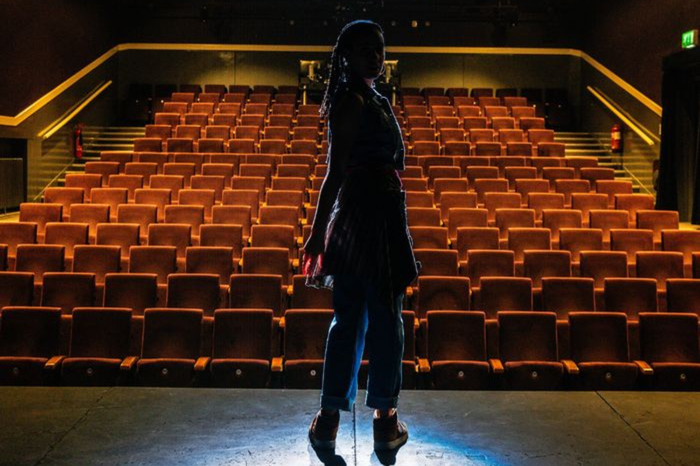Professor Bernhardi is a play of two halves
This politically driven play demonstrates creative potential, but ultimately loses its way

Professor Bernhardi tells the story of its titular character, a Jewish doctor in early-20th century Vienna, undergoing scrutiny and political persecution after denying a Catholic priest entry to the ward of a dying patient. The script, at its best, presented a vivid depiction of the insipid politician opportunism of those around Bernhardi, and the compelling emotional journey of its protagonist, forced to reckon with the fact that the truth of his good intention will not prevail in absolving him.
This was a production of two halves. Literally, of course, but also in how it felt to watch. The first was engaging and introduced interesting directorial ideas. The set was strong, a balance of naturalistic period décor and long abstract white banners, backlit so as to create silhouettes of those standing behind them. Director Charlie McGuire’s exploration of less naturalistic moments amongst the continuous dialogue gave some much needed punctuation and visual interest: using the silhouettes to subtly turn individual characters into faceless archetypes expressing societal prejudices was clever, and Kevina McGuire’s music, played by Alex Finlayson-Brown, was gorgeous, for the brief moments we got to enjoy it. Similarly, opening with a projection onto the white banners of the cast walking solemnly past the camera was a bold and intriguing start, though subsequent action was unable to maintain its sense of dreamy immersion, risking a discongruity between these elements.
“The director’s exploration of less naturalistic moments gave some much needed punctuation and visual interest”
Praise must certainly be extended to Ben Laumann for his fine performance as Professor Bernhardi. He really shone in the role, convincingly capturing the range of emotions through which the character passes, from the almost-naïve faith that truth will prevail, to the incredulity, anger, and eventual apathy as this is revealed not to be the case. Laumann’s charm, energy, and conviction on stage really carried the drama forward, and was a pleasure to watch. It was also welcome to have an Austrian character performing with an accent from the region – I suspect it is Laumann’s own, unless he was the only member of the cast asked to put one on. Accents are a difficult question without the resource to do it properly, but having a single actor with an appropriate one did by contrast make the others seem a bit ridiculous, sporting names like Professor Tugendvetter and Mr Hochroitzpointner whilst sounding like posh Londoners unable to pronounce each other’s names.
The second half started with great promise: a beautiful pipe-organ music cue, a new deep-red lighting state, the cast dancing non-naturalistically in the background whilst Bernhardi sat distressed at the front. This interesting and psychological direction delivered another compelling opening gesture, and a needed contrast to all the dialogue. The moment could have easily lasted five times longer, and to cut it off so prematurely, returning to plain white lighting and more drawn-out dialogue, felt almost cruel. Even worse was that the brilliant music was replaced by an unending ticking sound. I can think of no justification to play a clock ticking sound cue for twenty minutes of a play, except perhaps as some metatheatrical provocation to annoy the audience. Whilst clearly not the intention in this instance, it was certainly the effect achieved. Used briefly, it’s a cliché symbol of inevitability; used at such length one wonders if the techies have fallen asleep.
“The second half quickly abandoned that which helped draw the audience in”
From this moment the production seemed to lose its way. The first half was by no means perfect, but it was engaging. After a glimmer of interest, the second half quickly abandoned that which helped draw the audience in. There was almost no more music, and the projection element was seemingly forgotten about. This was a particular shame, as there was a lot of potential to bring energy and visual excitement back to the stage with projection. When characters discussed rowdy parliamentary scenes and the fervorous ‘town forum’ mentioned in the production’s blurb, one felt an opportunity missed to bring these external forces into the auditorium; both seemed distant and abstract without such representation. Instead, what remained was a gruelling sequence of long dialogue scenes, small group after small group of unlikable characters sat talking in an office. The notion that characters can be despicable as people but enjoyable as theatrical performances was evident perhaps only in Charlie McGuire’s bullish Professor Ebenwald; otherwise, the parade of smug, dishonest, and antisemitic characters felt increasingly tedious and unpleasant, rather than compelling and confronting.
By the end, Bernhardi’s apathy and disengagement with the political machinations surrounding him spoke for a similar feeling in the audience for the production itself. This was a shame: the first half demonstrated elements of an interesting and original production, using a compelling counterpoint of naturalistic and non-naturalistic elements to depict the troubled trajectory of its protagonist. Sadly, the second was unable to maintain this energy and rather fell into the trap of long and dialogue-heavy scripts, namely theatre that is increasingly difficult to enjoy.
 News / Eight Cambridge researchers awarded €17m in ERC research grants27 December 2025
News / Eight Cambridge researchers awarded €17m in ERC research grants27 December 2025 News / Downing investigates ‘mysterious’ underground burial vault 29 December 2025
News / Downing investigates ‘mysterious’ underground burial vault 29 December 2025 Lifestyle / Ask Auntie Alice29 December 2025
Lifestyle / Ask Auntie Alice29 December 2025 Sport / Hard work, heartbreak and hope: international gymnast Maddie Marshall’s journey 29 December 2025
Sport / Hard work, heartbreak and hope: international gymnast Maddie Marshall’s journey 29 December 2025 News / News in Brief: carols, card games, and canine calamities28 December 2025
News / News in Brief: carols, card games, and canine calamities28 December 2025







